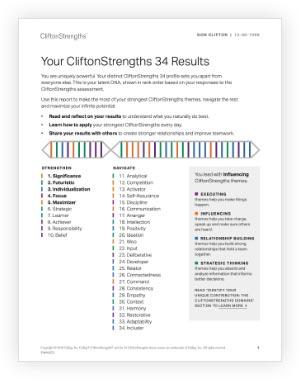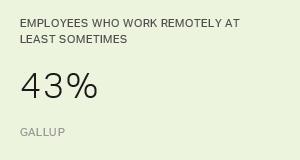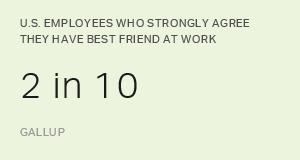Story Highlights
- Look deeper than simple personality types
- You need to reliably anticipate the needs of remote workers
- Ask three questions to better understand your remote workers
In Gallup's latest State of the American Workplace report, we found that 43% of employees say they work away from their team members at least some of the time, and the number is climbing.
A recent Fast Company article posits that remote workers' "personality type" predicts how they'll manage their daily workload. The author uses three examples of employees who work remotely: an introvert, an extrovert and an ambivert. All three say the same thing: They enjoy being around others, solitude makes them more productive, and schedules help.
These examples hint at the way our unique talents predispose us to like certain ways of doing things, and also the way those talents vary by context; everyone likes being alone sometimes and not others, and everyone needs some structure.
While it is useful to understand that we all approach work a little differently, the introvert/extrovert/ambivert framework simply isn't robust enough to help remote workers perform measurably better. Managers need a certain lens to clearly see the nuances of these workers -- to see their innate talents.
With a more complete picture of remote workers' talents, we can learn so much more about supporting and engaging them and improving their performance.
Over 22 million people now have that complete picture because they've taken the CliftonStrengths assessment. Their results give their leaders insights into how they think, feel and behave -- even if they never meet in person.
That's vital information: Teams coached to use their strengths are up to 15% more engaged, have up to 72% less turnover and are up to 29% more profitable. Great managers understand how their remote workers do the following.
Think. Talents dictate how people approach a task -- some are analytical puzzle-solvers, some need partners to ideate with, some are best motivated by tight deadlines. Whatever the person's default setting, managers must know how workers think to create the conditions they'll succeed in. Managers also need to set clear expectations, especially for remotes. Expectations are the most basic and fundamental employee need, but almost half of workers don't know what's expected of them at work. Managers who know how workers think and are explicit about expectations create conditions that enable top performance.
Feel. Scientists say that up to 70% of decision-making is emotional (and up to 95% of purchasing decisions). Managers who understand their workers' emotional landscape can better coach workers' decision-making process and adjust their work style. Consider, for instance, the employee who takes corrective feedback as personal criticism and gets mad at whoever gives it. A manager would need to guide that worker past his emotional response, helping him understand feedback as useful advice and not an insult. Such depth of understanding increases remote workers' feelings of being seen and valued, which is especially important for workers who rarely are seen, and helps employees improve their performance.
Behave. Our behavior is shaped by our dominant talents, the mental wiring that filters the way we see and understand the world. Integrating CliftonStrengths into their culture can help managers understand their employees' motivators and help them predict and direct their employees' behavior. Consider the employee described above, who takes tough feedback the wrong way. He gets angry because the perceived insult challenges his need for Significance, for example, or maybe it dings his sense of Responsibility or shakes his Belief. Whatever the case, his manager will need a tailored approach to coach him effectively. Strengths-based coaching not only helps workers perform better, but also tells them their boss cares -- and remotes who feel isolated, Gallup finds, can experience performance declines of up to 21%.
Those are big-ticket cultural issues, but day-to-day performance hinges on day-to-day management. So managers need to ask themselves a few questions about the conditions in which each remote worker thinks, feels and behaves:
-
What circumstances or strengths have enabled this remote worker to have a peak in performance? When you can articulate the case, you can replicate it in future projects.
-
Who was involved? Partnerships are critical for remote workers. When managers pair people who have complementary strengths, managers eliminate any chance of workplace isolation while increasing the proficiency of the remote team.
-
How can I further develop this employee in the areas of their greatest strengths? Remote workers' talents need to be developed over time with projects and partnerships that expand their abilities.
Gallup finds that four in 10 U.S. employees say they have the opportunity to do what they do best every day. Move that to eight in 10, and a company could realize an 8% increase in customer engagement scores, a 14% increase in profitability and a 46% reduction in safety incidents.
A genuine understanding of their talents helps remotes work with more success, greater enjoyment and the confidence that they contribute something that no one else can. Managers need to know their workers' talents so they can coach them to perform better in their role, to build better relationships with their team members, and to feel like they're learning and growing every day.
Help your workers improve their performance by doing more of what they do best:
- Discover how strengths-based development drives performance and how to make CliftonStrengths an essential part of your culture.
- Learn how CliftonStrengths solutions for managers can help you maximize your team's potential.
- Download Gallup's perspective paper Building a Culture That Drives Performance.




